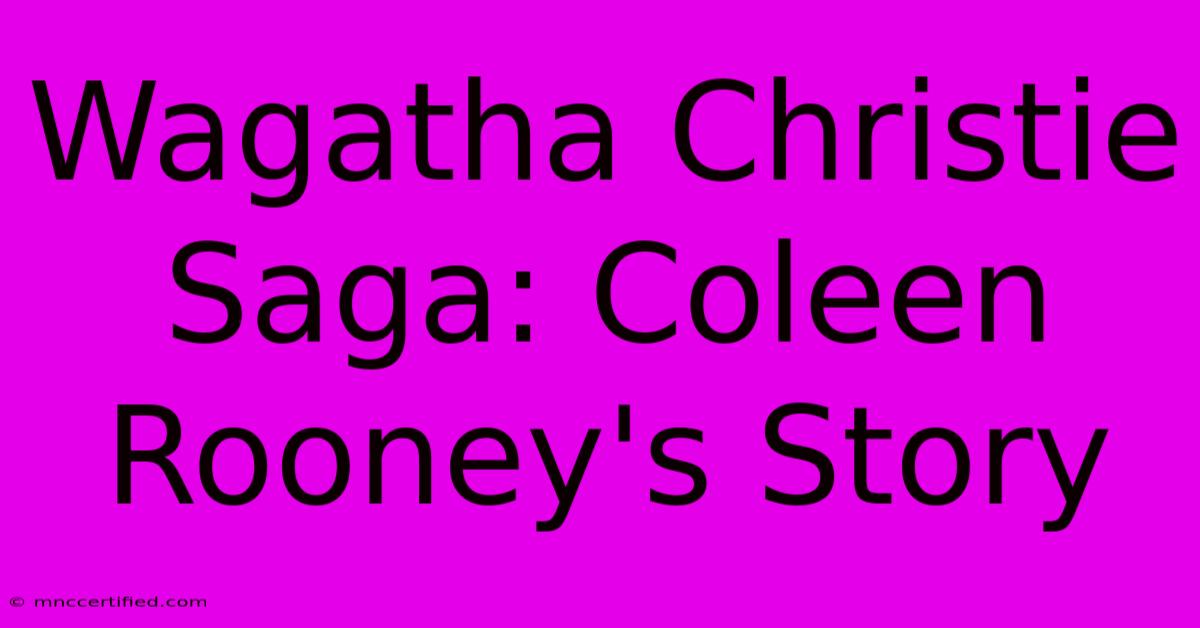Wagatha Christie Saga: Coleen Rooney's Story

Table of Contents
Wagatha Christie Saga: Coleen Rooney's Triumph and the Fall of Rebekah Vardy
The "Wagatha Christie" saga captivated the nation (and the world) in 2019, and its reverberations continue to this day. This compelling tale of social media accusations, public trials, and fiercely loyal WAGs (wives and girlfriends of footballers) centers around Coleen Rooney's meticulous investigation and subsequent public exposure of Rebekah Vardy's alleged leaking of private information. This article delves into the key events, the legal battles, and the enduring impact of this sensational story.
The Setup: A Carefully Orchestrated Sting
Coleen Rooney, wife of football legend Wayne Rooney, suspected a leak of private information from her Instagram account. To expose the culprit, she employed a clever tactic: posting a series of fake stories, carefully monitoring which accounts subsequently shared the false information. This methodical approach earned her the moniker "Wagatha Christie," a play on the famous mystery writer Agatha Christie, reflecting her detective-like skills.
The Reveal: A Public Accusation
After weeks of meticulously planned investigation, Coleen Rooney publicly accused Rebekah Vardy, wife of Leicester City striker Jamie Vardy, of leaking the false stories. Her now-infamous October 2019 tweet, stating, "It’s…… Rebekah Vardy’s account," went viral, igniting a firestorm of media attention and public debate. The statement, delivered with unwavering certainty, set the stage for a dramatic legal battle.
The Legal Battle: High Court Drama and Public Scrutiny
Rebekah Vardy vehemently denied the accusations, leading to a highly publicized libel trial in the High Court. The case became a media sensation, with every twist and turn dissected and analyzed by the public. The trial revealed a wealth of private messages between Vardy and her agent, Caroline Watt, which provided crucial evidence.
Key Moments in the Trial:
- The "leaked" stories: The specific stories shared on Vardy's account highlighted private details, such as Rooney's pregnancy.
- Watt's involvement: The role of Caroline Watt, Vardy's agent, became a central point of contention.
- The deleted messages: The revelation of deleted messages further complicated Vardy's defense.
- The judgment: Ultimately, the judge found in favor of Coleen Rooney, determining that Vardy's claim of libel was unsuccessful. The judge’s conclusion highlighted the lack of credible evidence to refute Rooney’s claims.
The Aftermath: Lasting Impact and Public Perception
The "Wagatha Christie" saga had a profound impact on the public perception of both women involved. Coleen Rooney emerged as a shrewd strategist, garnering significant public support for her calculated exposure of Vardy's alleged actions. Conversely, Rebekah Vardy faced intense public scrutiny and criticism. The trial highlighted the complexities of privacy, social media, and the far-reaching consequences of online actions.
The broader implications:
- Social media accountability: The case raised important questions about accountability and responsibility in the digital age.
- Privacy vs. public interest: The trial debated the fine line between personal privacy and the public’s right to know.
- The power of social media: The case demonstrated the immense power and reach of social media in shaping public opinion.
Conclusion: A Modern-Day Morality Play
The Wagatha Christie saga transcended a simple celebrity feud; it became a captivating narrative reflecting contemporary anxieties about privacy, social media, and the blurred lines between public and private life. Coleen Rooney's victory solidified her reputation as a clever and resourceful figure, while the case served as a stark reminder of the potential consequences of online actions and the enduring power of public perception in the age of social media. The story continues to resonate, offering a compelling case study in modern media and public discourse.

Thank you for visiting our website wich cover about Wagatha Christie Saga: Coleen Rooney's Story. We hope the information provided has been useful to you. Feel free to contact us if you have any questions or need further assistance. See you next time and dont miss to bookmark.
Featured Posts
-
Supermicro Stock Rallies Avoiding Delisting
Nov 19, 2024
-
Knox Leon At A Red Carpet Event
Nov 19, 2024
-
Kansas City Chiefs Gift Guide
Nov 19, 2024
-
Heymondo Travel Insurance Reviews
Nov 19, 2024
-
Your Cny Thanksgiving 2024 Guide
Nov 19, 2024